The Sounds, Words and Sights Of an Island in the French West Indies by Leonard J. Lehrman & Helene Williams
Comments Off on The Sounds, Words and Sights Of an Island in the French West Indies by Leonard J. Lehrman & Helene WilliamsFebruary 10, 2023 by Admin
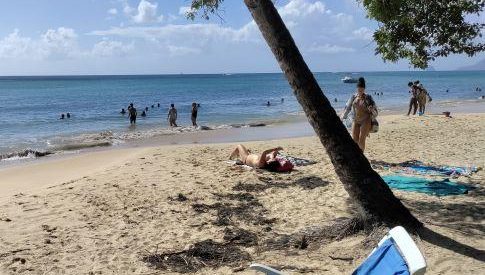
Q. What do the American composer/librettist Marc Blitzstein (1905-1964), the impressionist French painter Paul Gauguin (1848-1903) and the beloved black poet of “negritude” Aimé Césaire (1913-2008) have in common?
A. Inspiration from the beautiful, and historically tragic Caribbean island of Martinique.
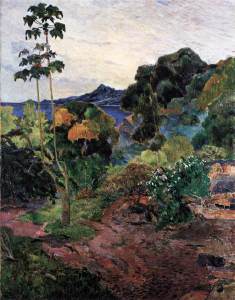 Gauguin spent 5 months there in 1887, and claimed he had discovered “who I am” in the tropical colors of the trees and the people he immortalized in 16 paintings, all of which he sold – to Van Gogh’s brother Theo, among others. So none of those paintings are still there, and neither is the house where he lived, as it was destroyed by the eruption of Mont Pélé, which also took the lives of 29,000 people in what was then the capital, St. Pierre, the year before the artist died. He had wanted so much to go back, but no teaching job was available, so he went instead to Tahiti, and then the Marquesa Islands, in the south Pacific, where he is buried. The Gauguin Museum in the northern part of the island, just south of the gradually being rebuilt St. Pierre, is well worth a visit, however, as it displays reproductions or photographs of all his work there, with ample bilingual narration describing his travails and artistic struggles. [See photo of his “Tropical Vegetation” above.]
Gauguin spent 5 months there in 1887, and claimed he had discovered “who I am” in the tropical colors of the trees and the people he immortalized in 16 paintings, all of which he sold – to Van Gogh’s brother Theo, among others. So none of those paintings are still there, and neither is the house where he lived, as it was destroyed by the eruption of Mont Pélé, which also took the lives of 29,000 people in what was then the capital, St. Pierre, the year before the artist died. He had wanted so much to go back, but no teaching job was available, so he went instead to Tahiti, and then the Marquesa Islands, in the south Pacific, where he is buried. The Gauguin Museum in the northern part of the island, just south of the gradually being rebuilt St. Pierre, is well worth a visit, however, as it displays reproductions or photographs of all his work there, with ample bilingual narration describing his travails and artistic struggles. [See photo of his “Tropical Vegetation” above.]
 Fort-de-France, mid-island, became the capital after the destruction of St. Pierre. From 1945 to 2001, the poet Aimé Césaire was its mayor. U.S. diplomat William B. Milam, now 86, told me that the US Consulate was established on the island in the early 1960s, primarily to monitor the burgeoning Communist Party there, of which Césaire had once been a member. But the mayor and the CP parted company over questions of de-Stalinization, and by the late 1980s the U.S. Consulate had been closed. Césaire’s memory is still honored – the island’s main airport is named after him – and his writings may be found in bookstores and the beautiful library named after the principal donor of
Fort-de-France, mid-island, became the capital after the destruction of St. Pierre. From 1945 to 2001, the poet Aimé Césaire was its mayor. U.S. diplomat William B. Milam, now 86, told me that the US Consulate was established on the island in the early 1960s, primarily to monitor the burgeoning Communist Party there, of which Césaire had once been a member. But the mayor and the CP parted company over questions of de-Stalinization, and by the late 1980s the U.S. Consulate had been closed. Césaire’s memory is still honored – the island’s main airport is named after him – and his writings may be found in bookstores and the beautiful library named after the principal donor of 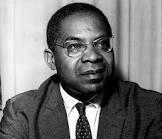 its initial collection, Victor Schoelcher (1804-1893), who was largely responsible for the abolition of slavery there in 1848. In that library, I found this simple but moving poem by Césaire (seen at left), first published in 1961, lamenting the tragic history of Martinique, and set it to music, in the original French, and my own singing translation (Copyright 2022).
its initial collection, Victor Schoelcher (1804-1893), who was largely responsible for the abolition of slavery there in 1848. In that library, I found this simple but moving poem by Césaire (seen at left), first published in 1961, lamenting the tragic history of Martinique, and set it to music, in the original French, and my own singing translation (Copyright 2022).
Aguacero
beau musicien
au pied d’un arbre dévêtu
parmi les harmonies perdues
près de nos mémoires défaites
parmis nos mains de défaites
et des peuples de force étrange
nous laissions pendre nos yeux et natale
dénouant la longe
d’une douleur
nous pleurions
Stormy downpour
musically true
falls under a tree that is leafless
harmoniously lost from view
close to our memories defeated
strength of our hands depleted
and to the peoples their force of strangeness
we let our eyes and our birth be suspended
untying the loin
of all our pain
that we wept
There are many readings of it available online, some with background music, but I believe this is its first musical setting. You can hear it at https://youtu.be/0N1zon6lJOY, sung by Helene Williams, with interludes played by violinist Daniel Hyman and hornist Noah Fotis, as the opening work in our opening concert this year, honoring Black History Month, Feb. 7, 2023.
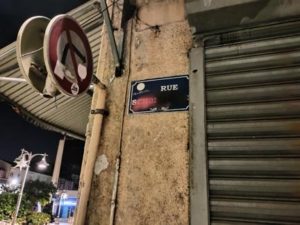 Over the last two years, statues and names of streets honoring Schoelcher have been toppled and defaced [see photo of street sign at right] – a case of cancel culture, which should be the subject of another article (as in the movie TÁR).
Over the last two years, statues and names of streets honoring Schoelcher have been toppled and defaced [see photo of street sign at right] – a case of cancel culture, which should be the subject of another article (as in the movie TÁR).
The main reason for our visit to Martinique this past December 21-28, however, was to see where the composer Marc Blitzstein (1905-1964), whose works Leonard has been adapting and completing since 1970, spent his last months. The day before we left, his completion of Sacco and Vanzetti was nominated for a Pulitzer Prize – the first either for Blitzstein or Lehrman.
(See previous reviews and articles on the opera in SoundWordSight.com)
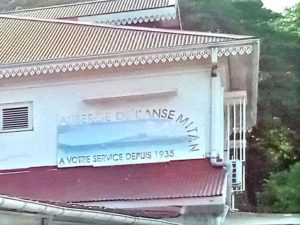 The oldest hotel on the island, L’Auberge de l’Anse Mitan, in Trois-Ilets, the western part of the island, just outside Fort-de-France, owned by the same family since 1935, was where Blitzstein stayed for a week in October, 1963. It is still visitable, though ever since a fire destroyed 8 of its 20 apartments, guests are no longer tourists – only friends and family. [See photo] We also visited Les Salines, a beach in the south about which he raved [see our photo of the beach from December 23, 2022 at the beginning of this article].
The oldest hotel on the island, L’Auberge de l’Anse Mitan, in Trois-Ilets, the western part of the island, just outside Fort-de-France, owned by the same family since 1935, was where Blitzstein stayed for a week in October, 1963. It is still visitable, though ever since a fire destroyed 8 of its 20 apartments, guests are no longer tourists – only friends and family. [See photo] We also visited Les Salines, a beach in the south about which he raved [see our photo of the beach from December 23, 2022 at the beginning of this article].
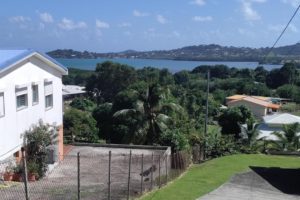 We also photographed the view he had from the 3-bedroom house called “Villa Hervé,” which he rented in Frégate-Le François, in the east. And we found and photographed the dock where three Azorean (Portuguese) sailors from Venezuela robbed him, and photographed the square, Place Stalingrad, now called Place François-Mitterand, to which he managed to drag himself and was picked up by the police and taken to the hospital. Then we drove to and photographed the Clarac hospital, including the view of the water he had there, when he died of his wounds.
We also photographed the view he had from the 3-bedroom house called “Villa Hervé,” which he rented in Frégate-Le François, in the east. And we found and photographed the dock where three Azorean (Portuguese) sailors from Venezuela robbed him, and photographed the square, Place Stalingrad, now called Place François-Mitterand, to which he managed to drag himself and was picked up by the police and taken to the hospital. Then we drove to and photographed the Clarac hospital, including the view of the water he had there, when he died of his wounds.
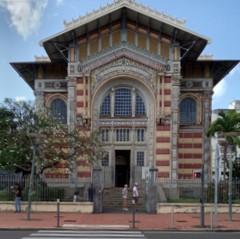 I presented a copy of the music he wrote in Martinique to the staff of the Schoelcher Library (at left), who were glad to put it in their Antilles archival collection. In his correspondence, he wrote that he had just “found the melody” for the female lead in the short opera The Magic Barrel, which he was writing, based on the eponymous story by Bernard Malamud. When I first looked at his libretto and music sketches, in 1970, I thought, as did David Diamond, that no one could finish it. But now, having adapted/completed 21 of his other works, I’m not so sure. Malamud’s literary agent is encouraging, and if the Blitzstein Estate agrees as well, I just may try to do so.
I presented a copy of the music he wrote in Martinique to the staff of the Schoelcher Library (at left), who were glad to put it in their Antilles archival collection. In his correspondence, he wrote that he had just “found the melody” for the female lead in the short opera The Magic Barrel, which he was writing, based on the eponymous story by Bernard Malamud. When I first looked at his libretto and music sketches, in 1970, I thought, as did David Diamond, that no one could finish it. But now, having adapted/completed 21 of his other works, I’m not so sure. Malamud’s literary agent is encouraging, and if the Blitzstein Estate agrees as well, I just may try to do so.
In 1974, after I finished Blitzstein’s Idiots First, for which Magic Barrel was to be a companion piece, the composer’s nephew Christopher Davis suggested: “Why don’t you write your own opera?” So I did. In fact nine of them, completing Sacco and Vanzetti along the way. Now maybe it’s time for The Magic Barrel too.
Category Sight, Sound, Word | Tags:
Comments Off on The Sounds, Words and Sights Of an Island in the French West Indies by Leonard J. Lehrman & Helene Williams
Sorry, comments are closed.

